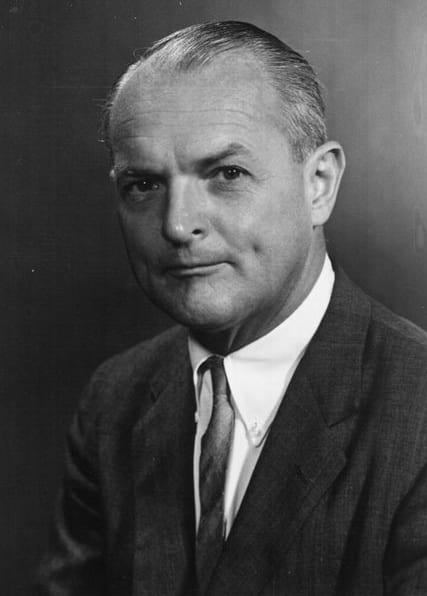Maynard Andrew Amerine
Remarkable scientist, scholar, teacher and author
Maynard A. Amerine was one of the world’s foremost authorities on both the cultural and technical aspects of grape growing and wine making. In the mid-to-late 20th century, he made the most singularly significant contributions of any one individual to the California wine industry. His accomplishments have been a major factor in California wines gaining their present status in the world.
Born in San Jose, California, on October 30, 1911, Amerine was raised in the San Joaquin Valley near Modesto. He completed his Bachelor of Science degree at the University of California, Berkeley in 1932. Prior to completion of his Ph.D. in 1935, Amerine was hired by Albert J. Winkler to work in the newly formed Department of Viticulture and Enology at UC Davis. The program was designed to give assistance to the California wine industry, which was just recovering from the restrictions of Prohibition. Amerine was appointed full professor in 1952 and was chair of the department from 1957 to 1962.

Giving a Post-prohibition Boost to the California Wine Industry
Amerine was initially engaged to explore the question of which grape varieties were best suited to the wide range of climactic conditions in California. The results of this work were published in the journal Hilgardia in 1944. Over time, the determination of grape-growing regions and the adoption of recommended varieties resulted in a significant improvement in the quality of grapes grown for wine production and a corresponding improvement in the quality of California wine. Another major work, Wines: Their Sensory Evaluation, which he co-authored in 1976 with mathematician Edward B. Roessler, initiated the objective study of taste analysis. Amerine, a prolific scholar, had an extensive publication record that continued more than 25 years after his retirement and until just before his death.
Amerine is recognized as an outstanding teacher, and he has left a legacy to the state of California and the world through the hundreds of students he has trained who have become winemakers and grape growers, including the late Robert Mondavi.
Cultivating a Rare and Significant Collection
One of Amerine’s most important contributions to the UC Davis Library was his enduring interest in the viticulture and enology collection and his dedication to its excellence. In 1972, he donated his personal collection of nearly 5,000 books and pamphlets to the UC Davis Library, many of which are rare and significant works on grape growing and wine making; the collection is available by request from the library’s Archives and Special Collections.
In addition to his donation, Amerine worked closely with library staff, co-authoring two books with different librarians: A Check List of Books and Pamphlets on Grapes and Wine and Related Subjects, co-authored with Louise B. Wheeler; and A bibliography on grapes, wines, other alcoholic beverages, and temperance: works published in the United States before 1901, co-authored with Axel E. Borg, distinguished librarian emeritus for food and wine. With his vast knowledge of the literature, Amerine also generously continued to assist librarians responsible for the subject areas of grapes and wine long after his retirement.
In Honor of Amerine
On September 14, 1991, the third-floor room in Shields Library that houses the grape-growing and winemaking collection was named in honor of Maynard Andrew Amerine, Professor Emeritus of Viticulture and Enology at UC Davis. Amerine, a distinguished scientist and scholar, a remarkable teacher, a prolific author, and an accomplished bibliographer died on March 11, 1998. Amerine’s work is still inspiring winemakers, scholars and researchers. In 2016, the library launched Label This, a project to crowdsource the transcription of Amerine’s collection of 5,000+ wine labels.